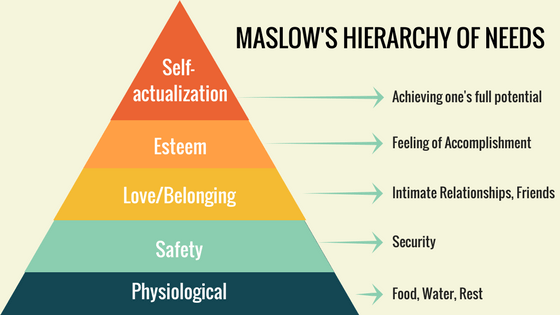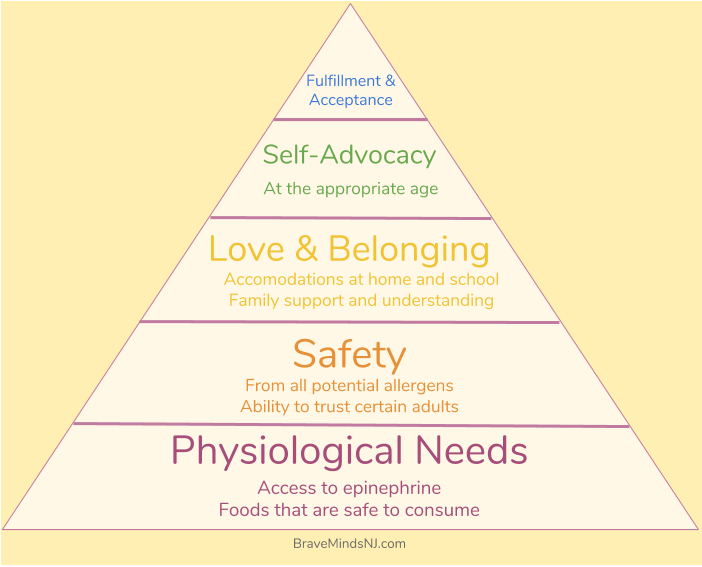In Part 1 of this series, we discussed the “why” and “how” of co-parents getting on the same page when it comes to a child’s food allergies. In Parts 2 and 3, we continue the “how” with some help from Maslow’s Hierarchy of Needs.
Maslow’s Hierarchy of Needs comes from Abraham Maslow’s work in developmental psychology. Maslow used a triangle to create a hierarchy that demonstrates both the needs of humans and progression of growth that occurs over a lifetime. My favorite simplified version of this hierarchy comes from author Jessi Christian:
Using the original hierarchy as a guide, I have included a scaling system of needs for kids with food allergies. This hierarchy will be our guide for Parts 2 and 3 of this blog series:
From bottom to top, this hierarchy prioritizes your child’s needs related to food allergies. One by one, discuss each need with your co-parent. What are each of your ideas for how to meet these needs? How can the current approaches be improved? Be sure to focus on ideas for the future, rather than mistakes of the past.
Physiological Needs
Some might think this part of the hierarchy is the simplest and most obvious. However, when it comes to food allergies, physiological needs are far from simple.
First and foremost, your child needs foods that are safe to consume. This should be a shared responsibility, with both parents being mindful of this need. Safe foods expand beyond the home to school, friend’s houses, restaurants, and more. With your co-parent, discuss how you will guarantee that your child will have safe foods to consume. Do you have a protocol for eating out at restaurants? How will you both handle your child eating at a friend’s house? Who is in charge of food shopping? If the current delegation of duties doesn’t allow everyone to gain needed experience on how to manage the food allergy, you might need to shake it up!!
In some families there is a managerial parent (who manages many aspects of the food allergies) and a more relaxed parent (who is softer about the food allergy rules).
Many times the managerial parent can end up holding a high level of the food allergy anxiety. Heightened anxiety fuels the need to be in control and reduces flexibility. On the flip side, the more relaxed parent may end up holding most of the flexibility and spontaneity, leaving the hardcore rules to the manager. This can be a recipe for confusion, insecurity, and emotional instability for the food allergy child. The anxiety and the flexibility should be shared so your child can learn how to integrate these two states of being.
Let’s go back to the grocery shopping example: if the managerial parent usually takes charge of groceries, allow the more relaxed parent to make some grocery runs. This involves a discussion about label reading and preferences your child has. Items purchased can be reviewed at home together after the trip is complete. Learning to manage food allergies is a process everyone has to actively participate in.
At every step of the way, work together to come up with solutions. If you’re not mindfully meeting this need together, your child could feel ostracized and perhaps forgotten.
Working together shows your child that their needs are more important than your differing opinions.
Beyond safe foods to consume, your child needs access to epinephrine and a trusted allergist. In the case of younger children, this means both parents and any caregivers (e.g. babysitters, grandparents) will have epinephrine on them at all times when with the child. For older children, this means the child also has epinephrine on them at all times. This prioritizes your child’s physiological safety and minimizes the chances of a traumatic or dangerous situation. You and your family have enough to worry about, so scratch this worry off the list by making sure there is 24/7 access to epinephrine from both parents.
Next let’s talk about being on the same page about physiological needs. Many times parents may disagree about what their child’s needs actually are. This is where doctor’s appointments can be helpful. If you don’t already have a trusted allergist for your child, work with your co-parent to find one and make an appointment. In order to be on the same page, both parents should attend at least some of the appointments with the allergist. If you already have a trusted allergist, ask yourself who usually attends the appointments. If the answer is the managerial parent, it’s time to let the more relaxed parent step in. This allows the relaxed parent to speak to the doctor directly about physiological needs and risks, allowing them to gather knowledge first hand.
When it comes to attending appointments, parents will often say…
“But Dad is more available to take Daughter, so he can be in charge of that.”
“It’s tough for Dad to take off of work, so it’s best for Mom to handle this.”
Remember that appointments with your child’s allergist are key to understanding proper care of your child’s food allergy. Sometimes it’s important to hear from the medical professional exactly what the recommendations are. This is a responsibility that both parents should share.
Safety

Mom believes that Son, who is allergic to walnuts, shouldn’t eat cookies unless he is able to read the package beforehand. Dad, on the other hand, encourages Son to “just look at” the cookies for walnuts and use his judgment, and believes that Mom is overprotective.
Mom and Dad are sending Son mixed messages about safety standards, which can result in a dangerous mistake. While the cookies may be tempting for Son, always reading a food label beforehand is by far the safer option. By erring on the side of caution, you’re doing your best to shield your child from a potential allergic reaction.
When it comes to trusting adults, co-parents need to be on the same page in order for their child to be and feel safe. Create a list of trusted adults with your co-parent and go over this list with your child. Discuss with your child how these decisions were made. For example:
“Mom and I agree that Grandma, your teacher, and your babysitter are trusted adults. This is because we have talked with all of them about your allergies, and they understand how to keep you safe. There may be other adults who want to keep you safe, but might not know how. The people on this list know exactly how to keep you safe.”
When everyone is in agreement about trusted adults, your child can feel a sense of safety and security from their caregivers.
In Part 3 of this series, we will explore the needs for Love & Belonging, Self-Advocacy, and Fulfillment & Acceptance. Stay tuned!
Check out the whole series:
-
5 Key Ways to Improve Co-Parenting Your Child with Food Allergies: Part 1 of 3
-
5 Key Ways to Improve Co-Parenting Your Child with Food Allergies: Part 3 of 3
Learn more about our Food Allergy Services
Contact us for a free phone consultation.
Connect Now







2 thoughts on “5 Key Ways to Improve Co-Parenting Your Child with Food Allergies: Part 2 of 3”
Comments are closed.